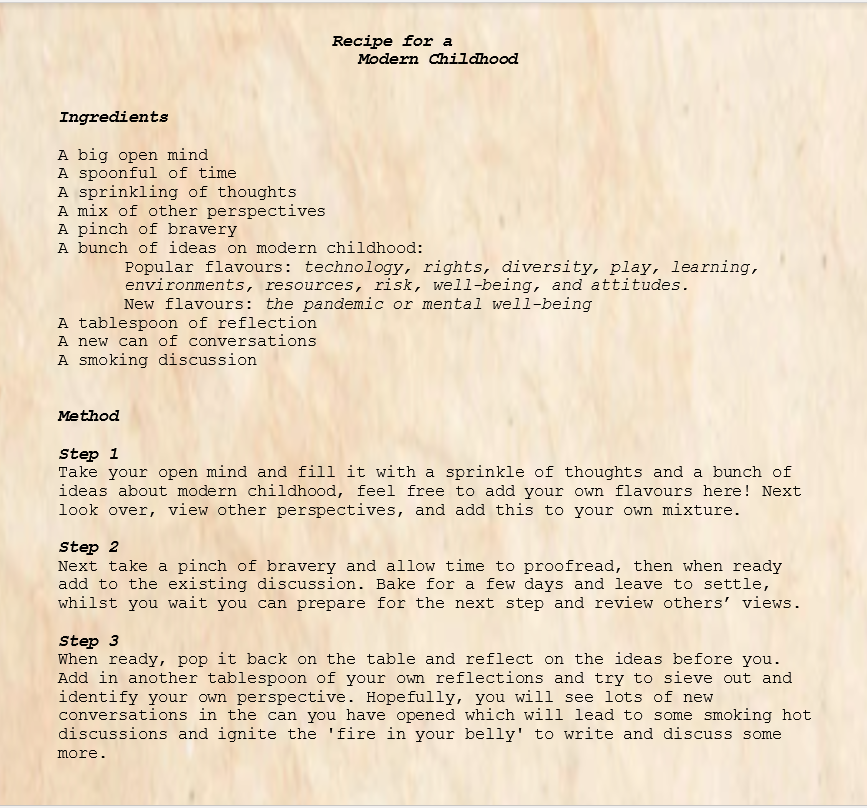This month our post is written by Karen Horsley (lecturer, Early Childhood) and Jill Robertson (Associate lecturer, Early Childhood)

Picture this, what if your challenge was to create an original recipe for modern childhood. What ingredients would you choose from the modern childhood pantry? Will the mixture be much like your own childhood? Or can you imagine new flavours and ways of mixing things up?
The recipes our students produced:
Like cooking or baking, childhood is so diverse, and there are so many recipes! We asked our students to reflect on their views of modern childhood in our Show & Tell ‘modern childhood’ induction activity. Here’s what they produced, and below are some ‘quotes and common phrases’ they used in their own recipes! As you can see it was full of different fantastic FLAVOURS
- Fruitful discussions: There was a refreshing look at some super examples of the wide range of materials to ‘spark imagination’ and ‘learning’ including the use of ‘loose parts’, and ‘tuff trays’, all current hot topics and flavours!
- Lovely passionfruit: A real passion for children, came across in the recipes including ‘I love’ and a ‘respect for play’ which many recognised as ‘an important way to learn’. This was coupled with the ‘importance of rights, voice and choice.’ All were combined with a ‘belief in the child’ and a commitment to ensuring their ‘health and wellbeing are protected’ and that they ‘reach their potential’.
- Array of exotic tastes: Many were not afraid to bring something unusual to the table. And felt ‘relief’ in the knowledge they could be ‘not afraid to tackle areas such as mental health’ coupled with a keenness to ‘overcome the fear of risky play’.
- Varying blends: Perhaps not everyone’s cup of tea! But there were some super variations. For example, ‘a fair bit of worry around too much screen time’ was ‘balanced’ nicely with ‘how important technology can be’ and a clear taste for the ‘many benefits of children using technology’.
- Organic produce: We saw much flavour for ensuring ‘children’s experiences and opinions are at the forefront of their learning environments’. Particularly in reference to the importance of ‘free experiences’ such as “’messy play’ and ‘outdoor experience’ which many recipes included.
- Unbelievable taste: There was an unbelievable taste and ‘excitement for learning’ that came from swapping recipes! Many ‘rethought ideas or reconsidered topics.
- Refreshing palate: There were some new fresh and interesting ingredients this year, including ‘the impact of the pandemic’ and the ‘value of discussing mental health’! Each brought their own exciting new flavours and added depth to the existing range of topics considered with a recognition that ‘ today’s society may be quite challenging for our children’.
You will recognise some of your own ingredients here, we have used your thoughts and voices! As you can see, having viewed these recipes we were delighted with the results. All deserved a mention! And collectively they are just incredible.
The next step:
If you did not have a chance to join in or want to continue your discussions here is your chance, we would love to hear from you. Please remember that following this recipe will produce your own unique results, and these might differ every time!
With that in mind:
- What could you produce from this recipe? The end results might amaze you and enhance your skills.
- Do you have the key ingredients – a little time, bravery, reflection, and an open mind?
- Remember, sharing your own thoughts, not only ignites your passion for learning it brings a lot to the learning of others too!
- Can you keep the discussion alive and strive to improve your understanding of childhood?
An Invitation
Most importantly, remember to keep your fire for learning about childhood. Keep exploring innovative ideas and using these super ingredients, we are sure you will continue to surprise yourself. You can start by thinking about:
Who or what has inspired you?
Who would you invite to the conversation and why?
(This could include key people, thinkers, writers, practitioners. What have you read in the media, academic literature?)
Please use the comment box below to tell us more and keep the conversation going!
